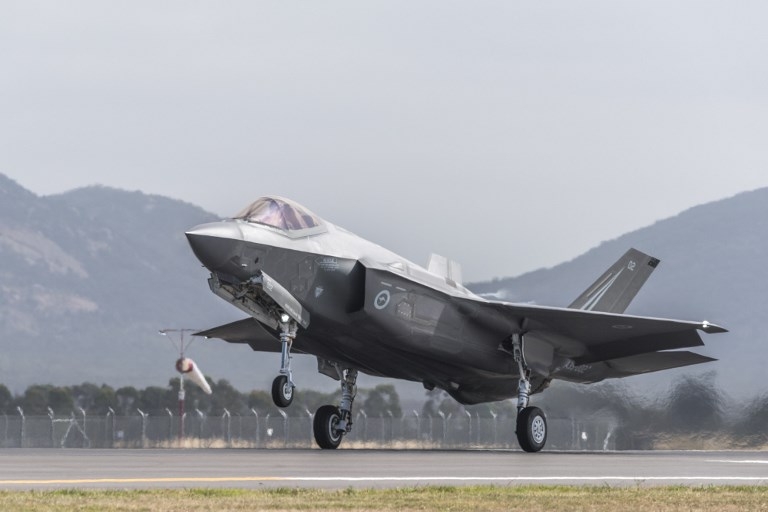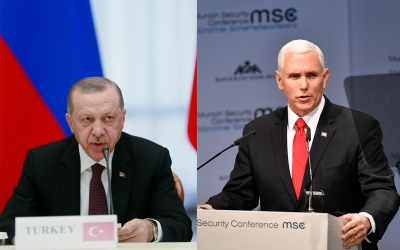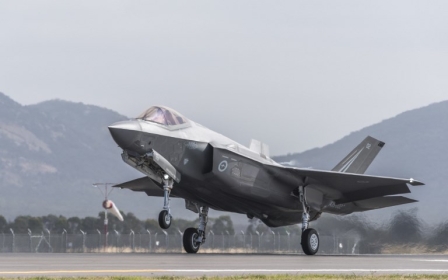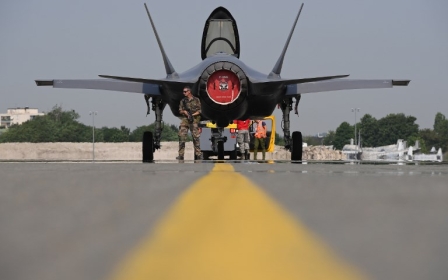Turkey rejects US pressure for Ankara to cancel Russian missile deal

Turkey rebuffed US pressure on Friday to purchase Russian missiles, saying Ankara was already in discussions over the delivery of the disputed S-400 defence system.
"We have signed a deal with Russia, and this deal is valid. Now we are discussing the delivery process," Foreign Minister Mevlut Cavusoglu said during a press conference with his Russian counterpart in the Turkish city of Antalya.
"We have an agreement with Russia, and we are bound by it," he said, adding that pressure from other countries was against international law.
Cavusoglu said Turkey had also met its obligations as a partner in the F-35 jet made by US company Lockheed Martin.
"Turkey is also a partner in the F-35 project. Some parts are being made in here in Turkey. Turkey has fulfilled its responsibilities in this regard," the minister said.
New MEE newsletter: Jerusalem Dispatch
Sign up to get the latest insights and analysis on Israel-Palestine, alongside Turkey Unpacked and other MEE newsletters
US attempts to block F-35 purchase
Ankara's statement comes after four US senators on Thursday introduced a bill to block Turkey's participation in America's F-35 fighter jet programme.
Republican Senator James Lankford, who is one of the sponsors for the bill, described it as an attempt to send "a clear message" to Ankara that it cannot acquire both American and Russian military technology.
"Turkey is an important Nato ally and willing partner in addressing a number of US national security priorities," Lankford said.
"It's concerning that Turkey would seek close defence cooperation with Russia, whose authoritarian ruler seeks to undermine Nato and US interests at every turn."
The bill is the latest chapter in an ongoing diplomatic spat between Washington and Ankara, which plans to purchase both US-made F-35 aircraft and Russia's S-400 defence system.
The US has argued that the Russian system would compromise the security equipment of the American fighter jets.
The four senators who introduced the bill dubbed the "Protecting Nato Skies Act of 2019", have all expressed alarm over Turkey's planned purchase of Russian S-400 missiles.
"Make no mistake: the Kremlin is an adversary of the United States and many of our Nato allies. The prospect of Russia having access to US aircraft and technology in a Nato country, Turkey, is a serious national and global security risk," said Democratic Senator Jeanne Shaheen, another co-sponsor.
The proposed legislation states that no US funds can be allocated to the transfer of the F-35 jets to Turkey, or to the transfer of accompanying data needed to maintain or support the aircraft.
It would also restrict US involvement in the construction of storage facilities in Turkey to hold the F-35s.
Only "a written certification" from President Donald Trump "that the government of Turkey does not plan or intend to accept the delivery of the S-400 air defence system" can override the restrictions, the bill reads.
It was unclear when the bill would come up for a vote in the Senate, or what level of support it would garner in Congress.
Last month, US Vice President Mike Pence personally appealed to Erdogan in a phone call to renege on a missile deal with Russia in favour of an American one, Middle East Eye reported exclusively.
During the phone call with Erdogan, Pence stressed that an alternative deal with Washington, which would see Turkey purchase Patriot missiles instead of the S-400, was still on the table, according to two Turkish sources with knowledge of the call.
The request stems from a US mandate that sanctions countries who conduct transactions with the Russian military industry, according to a law ratified by the US Congress in 2017 called CAATSA, or Countering America's Adversaries Through Sanctions Act.
Ankara is planning to replace its F-16 fleet in the near future with dozens of F-35s.
Middle East Eye delivers independent and unrivalled coverage and analysis of the Middle East, North Africa and beyond. To learn more about republishing this content and the associated fees, please fill out this form. More about MEE can be found here.




